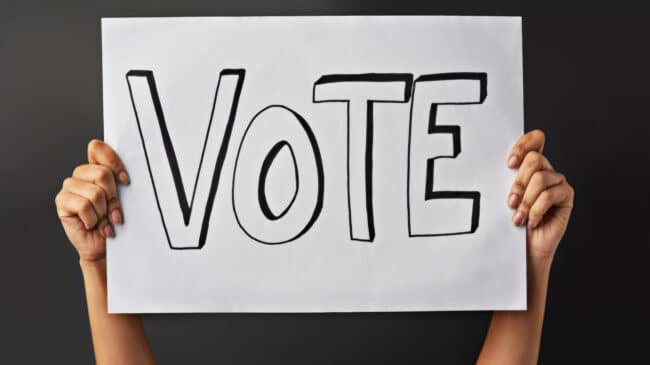Summary
Colorado Proposition 131 would change the election process for certain state and federal offices by establishing top-four open primaries and ranked-choice voting. The initiative would only affect elections for the U.S. Senate, U.S. House of Representatives, governor, attorney general, secretary of state, treasurer, Colorado University Board of Regents, the state board of education, and the state legislature.
Currently, Colorado has a semi-open primary system where only registered party members and unaffiliated voters are allowed to participate in each party’s primary elections. Only registered Democrats and unaffiliated voters may vote in Democratic Party primaries, and only Republicans and unaffiliated voters may vote in Republican Party primaries. The candidate receiving the most votes in each party’s respective primary advances to the general election—one candidate represents each party.
In the top-four open primary system proposed by Proposition 131, all candidates would appear on the same ballot in primary elections. Voters could cast their vote for any candidate, regardless of party affiliation. The top four candidates overall would advance to the general election, regardless of party affiliation. Rather than one candidate representing each party, multiple candidates from a single party could be among the top four that advance to the general election.
Proposition 131 would establish rank-choice voting in the general election. Under rank-choice voting, voters rank their preferred candidates rather than selecting one candidate to receive their vote. If no candidate wins a majority of first-choice votes, the candidate with the fewest votes is eliminated. That candidate’s votes are then redistributed based on voters’ ranked preferences. This process is repeated until one candidate receives a majority.
Notably, Proposition 131 is unlikely to take effect in the near future. In May 2024, the Colorado Legislature passed Senate Bill 10, a law that requires 12 municipalities to adopt and implement ranked-choice voting before Proposition 131 is implemented for state and federal elections. Given that only a few municipalities in Colorado currently use ranked-choice voting, Proposition 131 likely won’t be implemented until 2028 or 2030.
Fiscal Impact
Proposition 131 will likely have a negative fiscal impact, although the precise costs of implementation are unknown. The official fiscal impact statement prepared by Legislative Council Staff projects a $3.6 million increase in Department of State revenue in the second and third years of implementation. The projected increase assumes that the Department of State will adjust business filing fees to cover additional costs.
Proposition 131 is projected to cost $97,280 in the first year of implementation. Costs will rise substantially to $5,925,869 in the second year and $5,689,293 in the third year. The official cost estimates include expenditures for voting system software updates, poll worker training, voter outreach, and ballot redesign.
Proponents’ Arguments
Supporters of Proposition 131 argue that top-four open primaries will provide voters with more choice and reduce political polarization. For example, Loren Furman, Colorado Chamber of Commerce president and CEO, has argued that:
By expanding voter choice, we believe that Proposition 131 will encourage balance on both sides of the aisle and reduce the polarization that leads to bad policy for business.
Proponents suggest that Colorado’s current election system grants too little voice to voters who are not members of either major political party. Dick Williams, the former chair of the Colorado Republican Party, has argued:
We used to have a great process in Colorado. It was very competitive, and it worked well. Colorado has changed in the last 10 years. The electorate has changed. We went from a third, a third, a third in the electorate to now, nearly 50% of the electorate are unaffiliated voters. They are rejecting both parties, and they’re rejecting both parties because both parties are going to their extremes, both Republicans and Democrats.
Colorado Governor Jared Polis endorsed Proposition 131, saying:
While Colorado has among the best voter integrity and access protections, no system of voting is perfect, and I think instant runoff voting is better than our current system because it gives voters more choices. I’m hopeful that if it passes it will encourage participation and improve our democracy.
Opponents’ Arguments
Opponents of Proposition 131 argue that the initiative is a misleading attempt to undermine Colorado’s election system. For example, U.S. Representative Lauren Boebert has stated that “[r]anked choice voting is a scheme launched by well-moneyed interests who are only concerned with their own power and not giving Coloradans a choice at the ballot box.”
Some opponents have also argued that Proposition 131 is backed by powerful interests, including big corporations and wealthy individuals. Patrick Dillon, the co-chair of the Green Party of Colorado, has argued that:
Just like the origin of this proposal, it’s backed by big money. So in the open primary, what you’re going to find is those who have access to those resources, and those who are interested in protecting their corporate interests, they’re going to fund the candidates that best align with them.
Former Republican State Representative Dave Williams specifically targeted Kent Thiry, a sponsor of the initiative and former healthcare industry executive, saying:
Self-serving rich liberals shouldn’t be able to buy their way onto a ballot and manipulate democracy with deceptive marketing…Thiry wants to be governor and validate his ego by spending his massive wealth to change the rules of the game so he can have a better chance at winning.
Discussion
While expanding voter choice and allowing non-partisan voters to play a more significant role in elections are laudable goals, it is not clear that open primaries and top-four election processes are a good means for achieving those goals. Ranked-choice voting, on the other hand, is an effective strategy for offering voters more choices. Supporters of ranked-choice voting argue that it allows voters to choose their most preferred candidate first without worrying about wasted votes or spoiler effects.
Because ranked-choice voting alleviates concerns about wasted votes and spoiler effects, such ballots may lend more opportunity for minor party candidates. Moreover, there is evidence that ranked-choice voting can result in higher voter turnout and increased engagement with political campaigns. While critics have raised concerns that ranked-choice voting may be confusing for voters, research indicates that “ranked ballots do not raise the probability that a voter would cast a void (uncountable) vote, despite raising the probability of at least one violation of voting instructions.”
Regarding open primaries, political parties are fundamentally private organizations with the right to set their own rules for nominating candidates. To infringe on that right is to violate the freedom of association. No matter how large or powerful the two major parties may be, the government has no role in determining the process for their primary elections. That limitation does not prevent non-partisan voters from vocalizing their dissatisfaction with major-party nominees. Moreover, Colorado already has semi-open primaries, so unaffiliated voters are able to participate in partisan primary elections. Better alternatives for providing voters with greater voice and choice in the electoral process include allowing minor-party candidates to participate in debates and redrawing gerrymandered districts.
Overall, the Colorado top-four ranked-choice voting initiative has some laudable goals and contains some ideas worthy of consideration. However, mandating open primaries and a top-four system both conflict with other long-established goals of primary elections.

